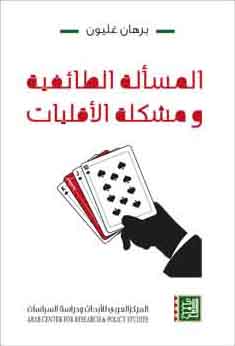 The Arab Center for Research and Policy Studies recently announced the re-publication of Burhan Ghalioun's The Sectarian Question and the Problem of Minorities. Originally published by Al-Talia in Beirut in 1979, this third edition includes a new introduction written by the author. The main idea of the book is to separate the sectarian question from the religious question, linking it, instead, to social and political relations, especially the power structure, debunking widespread claims that sectarian/ethnic diversity is one of the ills of Arab societies, rather than this diversity being a source of spiritual and intellectual wealth.
The Arab Center for Research and Policy Studies recently announced the re-publication of Burhan Ghalioun's The Sectarian Question and the Problem of Minorities. Originally published by Al-Talia in Beirut in 1979, this third edition includes a new introduction written by the author. The main idea of the book is to separate the sectarian question from the religious question, linking it, instead, to social and political relations, especially the power structure, debunking widespread claims that sectarian/ethnic diversity is one of the ills of Arab societies, rather than this diversity being a source of spiritual and intellectual wealth.
The author examines the question of "dormant sedition," and the way this notion has been used and abused by Arab regimes to impose dictatorship and deprive Arab peoples of political freedoms. The author argues that sectarian strife does not result from religious diversity, but from the absence of state-provided equal citizenship, or the absence of a nation-state that surpasses indigenous religious and ethnic links to the wider embrace of patriotism. In order to validate his hypothesis, the author discusses the concept of the minority and the majority, noting the difference between a social and political majority before delving into the question of sharing powers, drawing an extensive comparison between modernization in Europe and modernization in the East.
Ghalioun then moves to the concept of "sectarian conflict," posing the question: is there a solution to the question of minorities? At the end of the book, the author helps foster greater understanding of "sectarian society" by providing an overview of general concepts, including those of "nation," "community," "high culture and cultural consensus," and "the state and political consensus". From this emerges the essential thesis, or, in other words, whether cultural, gender, and religious minorities can only be understood in the framework of a transition from traditional national consensus, which is based on cultural consensus and the doctrinal consistency, to a national consensus based on the unity of authority and on popular will.
Click here to buy hard copies of ACRPS publications